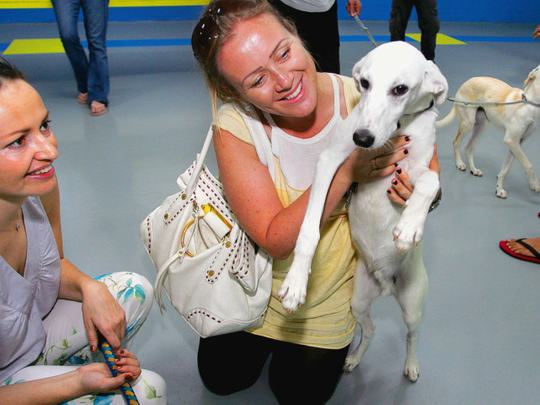
Dubai
Bringing a pet home can be one of the most memorable experiences in life. As four little feet step out of their carrier and patter around the house, inspecting every nook and corner, everyone at home is hooked at the moves made by the newest member of the family.
Taking that decision, however, can be a long and tough process, and rightly so. Without the right knowledge about the animal’s breed, eating habits and personality type, the best of intentions can still lead to the worst results.
In April this year, Gulf News published a warning from the Dubai British Veterinary Hospital on the need for extra precautions during the summer season.
Last year, the hospital received several cases of animals suffering from heat-related problems. At least 10 dogs were successfully revived. Four, unfortunately, died.
There are several such factors that UAE residents need to consider before they decide to bring a new furry family member home.
According to Montserrat Martin, founder of Friends of Animals, a Dubai-based animal welfare group, there is one option every animal lover should consider — adopting a rescued animal.
“Some people breed animals, then they don’t want them and these animals end up on the streets. There is no other option but to rescue an animal, if you ask me,” she told Gulf News.
By rescuing, not only would you offer the animal a loving home, you would also be taking it off the streets. Martin also felt animals from shelters could often be healthier than those that might be coming from breeders.
Dr Raimundo Tamagnini, veterinary surgeon at Energetic Panacea Veterinary Clinic in Dubai, explained why.
“Breeders usually have a few dogs that they consider exactly what they want for the breed, in terms of physical characteristics, and sometimes they keep breeding the mother with the son and so on. Because of this, while the good characteristics in the breed become better, some recessive genes can also cross with another gene and make the unhealthy traits dominant,” he told Gulf News.
He, too, encouraged people to consider adopting a rescued animal from the several shelters across the country. But if visiting a shelter doesn’t help, pet shops also offer several options for individuals and families.
Dr Tamagnini offered some simple steps people could follow to make sure they make the right choice.
“Check the area or the environment in which the animal is staying, because that will reflect on what has been happening,” Dr Tamagnini said.
If the cages aren’t taken care of, the water hasn’t been changed or the animals aren’t playful and happy, it might indicate negligent care. Professional pet shops prioritise animal welfare, following the instructions clearly laid out in UAE’s federal laws.
Once you have found that perfect kitten or puppy, ask the pet store representative about the necessary information, including where the animal is from. If the animal has been imported from outside the UAE, it needs to come with the necessary documentation.
“By law, imported animals can only be older than four months,” Dr Tamagnini said.
Another crucial aspect to consider is the animal’s vaccination. “Any animal that is bought, should come with a passport or vaccination book. That comes with microchip, first vaccination and deworming protocol,” he said.
One of the biggest challenges for individuals or families, however, is to not get carried away with excitement when looking at all the cute faces staring back at them.
“Sometimes you really want the pet. Even if you think the dog or cat is your soul mate, don’t rush into it,” Dr Tamagnini warned.
One simple step to take is to ask the shop for a probation period.
“Tell the pet shop you can make a little deposit and ask for a two to three days probation period so that you can take the animal to the vet and make sure it is healthy. If the seller is honest, is confident about vaccination, they shouldn’t have a problem,” he said.
If that doesn’t work out, you can still exercise precaution by taking the animal to the vet before going back home. This will ensure you know everything there is to know about the animal’s breed, eating habits and any special instructions for care.
Find out what the pet is currently having as a diet. They are already going to experience a change in home, people and smells, so keep this one thing constant to help them adapt.
Dr Tamagnini said: “If you want to move to another kind of pet food, perhaps one that the vet tells you about, take a little bit of time so that not everything is happening in one go.”
Ultimately, it is a decision that requires a lot of thinking and consideration.
“If you want an animal that wants to be with you, go for walks, teach you something and learn something as well, and is basically a friend — take a dog. If you are a busy person, don’t have a big space, don’t have time to take the animal for walks — go for a cat. They are more individual, they are funnier, you can catch them hunting or playing around. Again, consider the breed you are buying and what it would mean. If you cannot brush the cat every day and are concerned about hair on your sofa, probably don’t go for a Persian cat. If you have a baby, probably don’t buy an aggressive or nervous dog,” he said.
While this may be a lot of information for a first-time pet owner, getting this decision right is crucial. So, don’t rush into it.
— The writer is a freelance journalist with Gulf News









